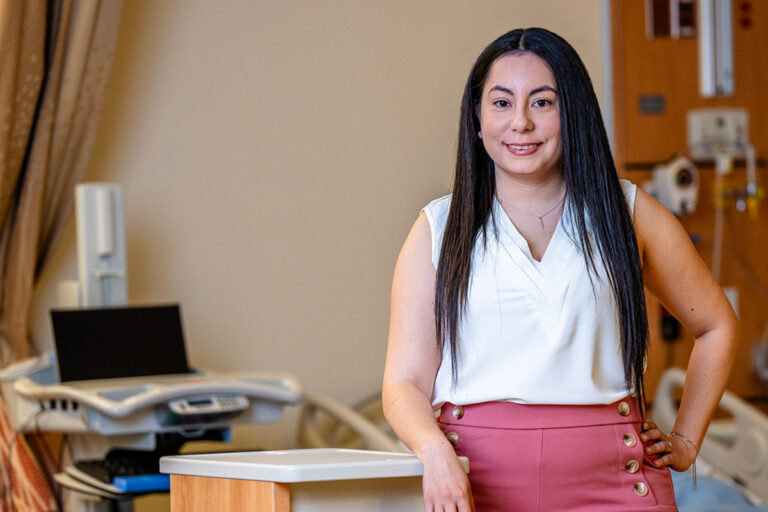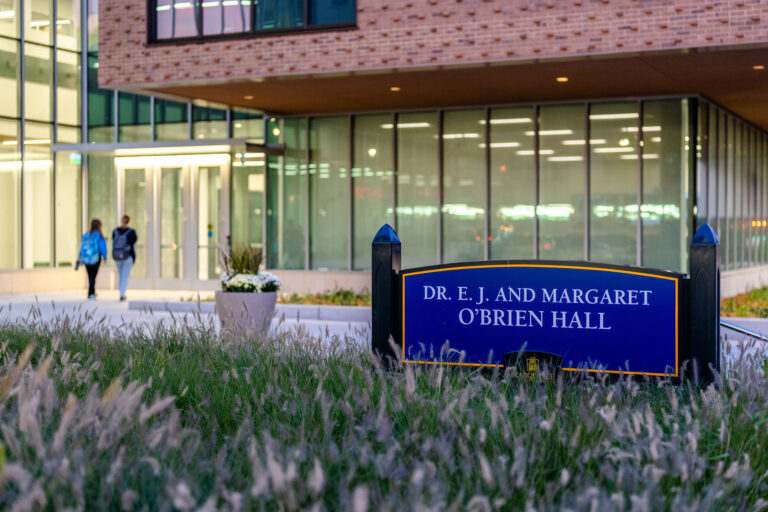In an effort to promote research and scholarship conducted by Marquette faculty and staff, the Office of Marketing and Communication and the Office of Research and Sponsored Programs have partnered to present a monthly recap of recent grants awarded to faculty and staff.
The report will be featured in Marquette Today each month.
The following grants were awarded to university faculty and staff in December 2020.
FW-HTF-P: Understanding the social and ethical implications of algorithmic decision making by nurses using the Rothman Index in a large-scale hospital setting
$150,000 – National Science Foundation

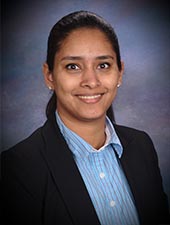

Dr. Shion Guha, assistant professor of computer science (PI), and Dr. Lilly Campbell, assistant professor of English, in the Klingler College of Arts and Sciences; and Dr. Amrita George, assistant professor of management, in the College of Business Administration.
Abstract: The research team is studying implementation of the Rothman Index — a proprietary early warning algorithmic platform designed to reduce patient mortality — in hospital work environments. Virtual Care Nurses currently mediate between the platform and health practitioners on the floor, making algorithmic decisions. The objectives of the one-year planning grant include an exploration into the Rothman Index, collecting and analyzing preliminary data about experiences with the Rothman Index in the Virtual Intensive Care Unit work environment, and engaging in participatory design to improve workplace protocols and practices.
Exploring relationships between Culture of Safety and Failure to Rescue
$2,480 – Sigma Theta Tau Delta Gamma At-Large Chapter-Milwaukee


Holly Losurdo, Ph.D. student (PI), and Dr. Jill Guttormson, associate professor (Mentor), in the College of Nursing
Abstract: This study is designed to examine Culture of Safety (COS) in its entirety, including its relation to Failure to Rescue (FTR). Since COS leads to improved communication of patient deterioration, and potentially decreases FTR, it is imperative that we understand the relationship between all aspects of COS and FTR. This knowledge can drive meaningful change using a systems framework and support future nursing research focused on interventions to improve COS, timely Rapid Response System activation and subsequently patient outcomes.
Testing the impact of a virtual debriefing for meaningful learning training program
$4,930 – Sigma Theta Tau Delta Gamma At-Large Chapter-Milwaukee
 Dr. Aimee Woda, assistant professor in the College of Nursing
Dr. Aimee Woda, assistant professor in the College of Nursing
Abstract: This project represents a new arm of a multi-site pilot study with the purpose of evaluating the feasibility and quality of a traditional in-person Debriefing for Meaningful Learning (DML) training. The purpose of this new arm of the research is to develop and test virtual material to be used in a training program for teaching debriefers how to implement DML and compare them with in-person training.
4 Schools Mental Health Initiative
$4,930 – Sigma Theta Tau Delta Gamma At-Large Chapter-Milwaukee
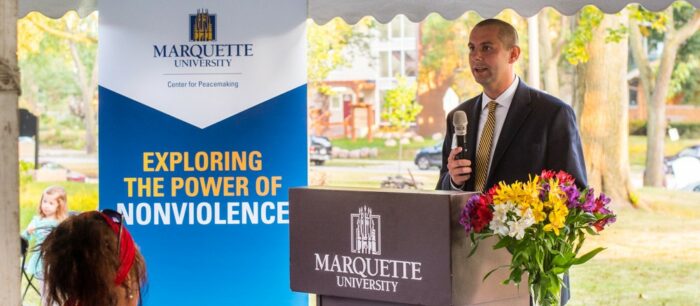 Patrick Kennelly, director (PI), and Sherri Walker, assistant director, for the Center for Peacemaking
Patrick Kennelly, director (PI), and Sherri Walker, assistant director, for the Center for Peacemaking
Abstract: The 4 Schools Mental Health Initiative is a family-centered program designed to support students struggling with mental health, academic and/or behavioral challenges. This initiative improves social-emotional outcomes and restores relationships by providing strategies that better equip students to become resilient learners while simultaneously building school and family partnerships.
Evaluating the implementation of an innovative intradisciplinary, multi-patient simulation experience pilot in a university setting
$1,500 – National Association of Pediatric Nurse Practitioners Foundation


Katie McDermott, part-time faculty (PI), and Dr. Norah Johnson, associate professor, in the College of Nursing
Abstract: Pediatric acute care nurse practitioner and prelicensure registered nurse students rarely get to collaboratively manage acutely ill patients during clinical rotations, however upon completion of their academic programs, they will consistently interact in the hospital setting. The purpose of this study is to evaluate the implementation of a pilot simulation experience for pediatric acute care nurse practitioner and prelicensure registered nurse students rarely to collaboratively manage acutely ill patients. The experience would feature learning objectives congruent with certifying organizations, and global programmatic learning outcomes.
Targeting the brain as an effective treatment for sleep apnea
$150,000 – American Heart Association
 Dr. Deanna Arble, assistant professor of biological sciences in the Klingler College of Arts and Sciences
Dr. Deanna Arble, assistant professor of biological sciences in the Klingler College of Arts and Sciences
Abstract: Recent evidence implicates a yet undefined, neuronal mechanism in the causes of disordered breathing. This proposal hypothesizes that obesity-induced hypothalamic neuronal dysfunction underlines the manifestation of sleep apnea. The investigator will test two key hypothalamic players for their role in disordered breathing.
Public opinion research on artificial intelligence in public health responses
$18,690 – American Association for the Advancement of Science


Dr. Michael Zimmer, associate professor (PI), and Dr. Praveen Madiraju, associate professor, of computer science in the Klingler College of Arts and Sciences
Abstract: Artificial intelligence has numerous potential applications in the fight against COVID-19, as well as immense promise for public health in predictive medical analytics, precision medicine, and automated diagnostics and decision making. AI has the potential to create enduring benefits but will require the trust and support of patients and community members, especially those historically underserved by the healthcare system. This proposal will allow experts to conduct research on public attitudes and trust about the use of artificial intelligence technologies in the current pandemic, and in public health generally, with particular focus on vulnerable communities.
For more information: AAAS project to promote socially responsible artificial intelligence in healthcare kicks off with public opinion work
College of Education Curriculum Development: Designing Hybrid Courses for the Educational Leadership Program
$10,000 – Myers Family Foundation
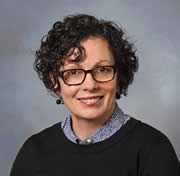 Dr. Leigh Van Den Kieboom, chair and associate professor of educational policy and leadership in the College of Education
Dr. Leigh Van Den Kieboom, chair and associate professor of educational policy and leadership in the College of Education
Abstract: Funds will be used to design online-hybrid courses for the Educational Leadership program.
Adolescent Coping and Response to COVID-19 and Its Impacts on Their Schooling
$2,410 – American Psychological Association



Dr. Gabriel Velez, assistant professor of educational policy and leadership, and Maddie Hahn, graduate assistant for educational policy and leadership, in the College of Education; and Brian Troyer, dean of undergraduate admissions
Abstract: This award will allow researchers to study young people’s perspectives and processing to better understand how the pandemic is shaping their developmental trajectories through their learning and schooling.
Black/Latino Student Achievement Fellowships
$128,013 – Employ Milwaukee
 Dr. Robert Smith, Harry G. John Professor of History in the Klingler College of Arts and Sciences and director of the Center for Urban Research, Teaching and Outreach
Dr. Robert Smith, Harry G. John Professor of History in the Klingler College of Arts and Sciences and director of the Center for Urban Research, Teaching and Outreach
Abstract: This award will fund two Black/Latino Student Achievement Fellowships through a partnership between the Center for Urban Research, Teaching and Outreach and the Educational Policy and Leadership Department in the College of Education.
Sensor for continuous bacteria viability monitoring
$5,000 – A.O. Smith Corporation



Dr. Chung Hoon Lee, associate professor; Dr. Henry Medeiros, assistant professor; and Dr. James Richie, associate professor, of electrical and computer engineering in the Opus College of Engineering
Abstract: The goal of this project is to identify technologies capable of continuously monitoring the concentration levels of viable bacteria in drinking water. In this project, researchers will test the feasibility of a microwave measurements and a machine learning based sensing system to detect bacteria in water.

